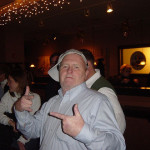Ever heard of a fast food burger joint that sells fruit smoothies – and kale? Well, you have now.

Meet Jon Olinto and Anthony Ackil, childhood friends and co-owners of the Boston-based b.good fast food chain.
Started in 2004, b.good’s goal was to sell high-quality fare, proving that fast food can still be real food. The pair started with burgers and fries and was focusing on growth when Olinto realized the gourmet burger market was rapidly becoming saturated.
The company quickly expanded its offerings to include items like acai berry smoothies, kale and quinoa, reaching out and grabbing the business of even those who rarely eat hamburgers.
While hamburgers and fries are still on the menu, the addition of healthier choices has proven successful – 2014 sales are up 25 percent over 2013 at all locations that have been open for a year or longer.
As of New Year’s Day when the latest addition to the chain opens, there will be 19 b.good locations. The chain plans to add another 10 to 15 locations in 2015 in various areas, including the South Boston waterfront area, Connecticut and New Jersey.
No matter which b.good location customers visit, they can be sure that the food they are eating is local. The restaurant purchases food from farms within driving distance and post the food’s source on a chalkboard so customers know where it came from.
While some stores are corporate owned and other are franchises, all offer traditional shakes and burgers as well as healthy choices for the more diet-conscious. No matter what menu item you choose, b.good makes sure you get real food real fast.



 1. Go empty-handed. Your hands need to be free for handing out business cards, taking down notes and phone numbers, and shaking hands. Leave your cell phone, coat, and brief case somewhere else.
1. Go empty-handed. Your hands need to be free for handing out business cards, taking down notes and phone numbers, and shaking hands. Leave your cell phone, coat, and brief case somewhere else. 2. Arrive early. The earlier you can communicate with people, the better. Keep in mind that people don’t want to talk business when that’s all they’ve been doing for the past few hours.
2. Arrive early. The earlier you can communicate with people, the better. Keep in mind that people don’t want to talk business when that’s all they’ve been doing for the past few hours. 3. Remember your business cards. There’s no reason not to have a stack of business cards on hand at a networking event. Don’t forget them.
3. Remember your business cards. There’s no reason not to have a stack of business cards on hand at a networking event. Don’t forget them. 4. Keep the name badge to your right side. Because you will likely shake hands with your right hand at all times, you want your badge to stay on that side. It will be more noticeable when you extend your hand!
4. Keep the name badge to your right side. Because you will likely shake hands with your right hand at all times, you want your badge to stay on that side. It will be more noticeable when you extend your hand! 5. Don’t stay with the same people. No matter how intense or interesting the conversation is, move on to new people every so often.
5. Don’t stay with the same people. No matter how intense or interesting the conversation is, move on to new people every so often. 6. Stay interested. Rather than spending your time answering questions, try asking them. Maintain eye contact and don’t let your eyes wander around the room during a conversation.
6. Stay interested. Rather than spending your time answering questions, try asking them. Maintain eye contact and don’t let your eyes wander around the room during a conversation. 7. Lay off the alcohol consumption. It might seem obvious, but keep the drinking to a minimum. Even though alcohol might be present at the party, you must still remember you’re making a lasting impression on many of the people there. Avoid drinking altogether, but if you must do so, alternate water or other non-alcoholic beverages between drinks.
7. Lay off the alcohol consumption. It might seem obvious, but keep the drinking to a minimum. Even though alcohol might be present at the party, you must still remember you’re making a lasting impression on many of the people there. Avoid drinking altogether, but if you must do so, alternate water or other non-alcoholic beverages between drinks. 8. Follow up! What’s the sense in going to a holiday business party if you don’t follow up? Catch up with your new connections on LinkedIn or shoot them an email within two days after the party.
8. Follow up! What’s the sense in going to a holiday business party if you don’t follow up? Catch up with your new connections on LinkedIn or shoot them an email within two days after the party.
